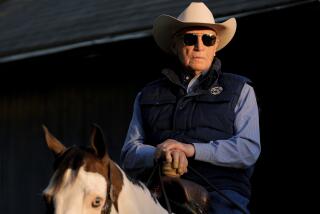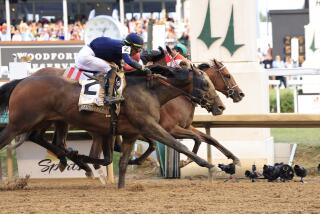New Blood in Derby--It’s Doctored
- Share via
LOUISVILLE, Ky. — It will probably come to be known as the Dosage Derby--but not for the reason they think.
Dosage, if you haven’t been paying attention, is the complicated formula for predicting Derby winners on the basis of how blue their blood is, how many of their ancestors hobnobbed with royalty. No matter how fast they run in company with other lowlifes, riff-raff will quit like dogs when they run into people with monocles, goes the theory.
But dosage in the 1986 Derby may come to refer to the amount of an illegal substance ingested or injected into the combatants on the eve of battle. It should probably be known as the Rx Derby. The Run for the Poppies.
There’s a good chance this field, if it were human, would have been busted at the three-eighths pole. I mean, these guys didn’t need legs to get them to the finish line, they could have flown there.
This field was a pharmaceutical delight. This bunch was performing in a vat of Butazolidin and Lasix. With a street value of $40 million, presumably.
To be sure, neither is the kind of drug to be dropped from low-flying airplanes out of the jurisdiction of Miami Vice, but a chemical aid to performance, all the same. The legal definition of both is “drug.”
It’s interesting to note that the only winner in Kentucky Derby history to get his number taken down was unfrocked because of Bute in his system. A ball game is never over till the final out, but a Kentucky Derby is never over until the lab tests come back and the federal courts get through with them.
It’s not likely they will change this year’s result. The 1-2 finishers, Ferdinand and Bold Arrangement, were the only two entries not relying on chemical substances, although Bold Arrangement’s light-hearted English trainers did load him up with Guinness stout in his mash. But that, of course, is a legal drug anywhere.
The beauty of Kentucky racing is, it’s conducted along the lines of a traveling, turn-of-the-century medicine show. It has elements of the carnival shell game about it. Rubes, beware. The way it should be. We’re getting too soft in this country anyway, expecting the government to protect us from our own greed and ignorance. Kentucky turns the clock back to David Harum’s time. W. C. Fields would have approved totally.
They have decriminalized the statutes against certain drugs since the day in 1968 when they drummed Dancer’s Image out of the winner’s circle because they found phenylbutazone in his system. That would be permitted today, but the decriminalization is not retroactive.
Of course, this year is not the first time horses have run on Kentucky tracks with something besides blue grass churning around in their bloodstreams. This was hard country. You not only had to watch out for guys on river boats with their own decks but trainers with their own syringes. You not only had to take a shower with your wallet in your hand but sleep with the dresser pushed up against the rooming-house door.
It hasn’t changed much. The advent of the film patrol, the computers and the multiple stewards and judge locations may have sissified racing in other locations, out in lah-dee-dah Beverly Hills and Long Island, for instance, but not in hardboot country. You still check the horse’s mouth--and cut the cards--here.
You take a horse named Southern Appeal in Saturday’s Kentucky Derby. A pretty nice sort, he had run 14 times and won three of them. No Man o’ War but no burro, either.
The rider was much more interesting: Jesse Davidson was the leading rider in the country not so many years ago. Then, one day in Bowie, Maryland, he got impatient and he rode to win. Not the race, money.
He and a group of other riders got together and decided to upgrade the purse for an otherwise undistinguished little plating race on the card. You do this by deciding on the order of finish before the race is run--and betting accordingly.
This is done more often than you might think. A horse race is the easiest athletic contest to fix in the whole spectrum. Because horses can’t talk. And jockeys won’t.
Anyway, Jesse and his buddies-- accomplices was the word the D.A. preferred--were clumsy. The horses were cooperative. A horse, by and large, has very little interest in winning or losing. He runs only to get the whole thing over with and get back to the oats.
But the whole thing was so sloppily done that, when the riders sent their agents and relatives to collect the bets, the track refused to pay them. They considered it just a complicated form of armed robbery.
So did the courts. Jessie went to prison. Another rider, Eric Walls, committed suicide.
Jesse was in the same prison as G. Gordon Liddy, the Watergate conspirator, for a few months, and when he got out, he sued to get his license to ride reinstated. The state relented to the extent of permitting him to exercise horses but not to ride for purses. Jesse did this for a while and then found a lawyer who thought that a man who had paid his debt to society should be allowed a chance to go out and run up a new one.
Most states would just as soon license Jesse James as Jesse Davidson. The agency that polices thoroughbred racing hounds him wherever he goes and argues against his re-licensing.
They couldn’t do much about Kentucky. Jesse turned up in the irons in the field of the most prestigious race in America Saturday, the Kentucky Derby. You can imagine the flap if he had won. But Kentucky shrugs. This is a track that prints a warning against pickpockets in its Derby program. After that, you’re on your own.
Fortunately (or unfortunately, depending on your point of view), Southern Appeal was a no-account dawdler not even Lasix could help and he ran far down the track. Otherwise, the Ballad of Jesse Davidson might be on the top of the charts today. Ah, my old Kentucky home! Weep no more, my lady, oh, weep no more today. And hang on to your wallet.
More to Read
Go beyond the scoreboard
Get the latest on L.A.'s teams in the daily Sports Report newsletter.
You may occasionally receive promotional content from the Los Angeles Times.










